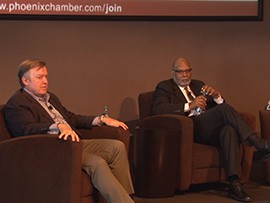Cronkite News has moved to a new home at cronkitenews.azpbs.org. Use this site to search archives from 2011 to May 2015. You can search the new site for current stories.
Leaders: Arizona must increase higher ed funding to improve economy
If Arizona doesn’t change course and increase funding to higher education, the state’s economic health will decline, Arizona State University President Michael Crow told a group of business leaders Thursday.
He pointed to two statistics: Arizona and New Mexico have the lowest level of educational attainment. The two states also have the fastest falling per capita gross domestic product.
There’s a correlation, he said.
The state Legislature cut $99 million in funding to the state’s higher education institutions for the budget year that begins July 1.
Crow said the quality of the workforce would suffer if funding continues to decline and a limited workforce would restrict economic growth.
“(The lack of funding won’t just lead to) economic decline, it will be suffering. It will be economic suffering,” Crow said.
He made the comments during a panel discussion hosted by the Greater Phoenix Chamber of Commerce in downtown Phoenix.
Todd Sanders, the chamber’s president and CEO, said declines in higher education funding could lead to a rise in tuition, which limits access to education.
“It starts to dry up our talent pool. That presents a real problem,” Sanders said. “The business community needs to stand up and be a part of the solution for the state to really start to look at higher education as an asset and not a cost.”
Both Crow and Rufus Glasper, chancellor at the Maricopa County Community College District, called on members of the business community to use their networks to start a conversation about the issue and find a consensus.
Historically, the business community has focused its political efforts on lowering taxes and removing regulations, but Crow said business leaders must make higher education funding an objective.
“A qualified workforce is what any business is looking for,” said Ed Munson, executive committee chair for the Greater Phoenix Chamber of Commerce. “We are very concerned in the business community about the cuts to higher education in the state budget.”
Over time, the decreasing higher education budget will impact the state’s ability to attract and retain high quality businesses, Munson said.
There are flaws in the system the business community could help change, Glasper said. For example, under current law if higher education institutions obtain funding from other sources – beyond tuition and fees – they have to give up the same amount of funding from property taxes.
“Where’s the incentive? That’s a disincentive,” Glasper said. “We can make money, but in today’s environment, we cannot keep it.”
Both Glasper and Crow agreed that a longterm solution could be achieved through collective action within the community.
“It is possible for us to make a difference in Arizona,” Glasper said.









